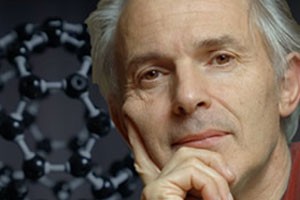
Nobel-Winning Nano Researcher Makes UC Visit
Sir Harold "Harry" Kroto is a Nobel Laureate who was knighted in 1996 for his contributions to chemistry.
He's also a sought-after speaker with a knack for making science come alive for lay audiences so much so that in 2001, Kroto earned the Royal Society's Michael Faraday Award, given annually to a scientist who excels in communicating science to the public in the United Kingdom.
On April 10 and 11, Kroto's myriad contributions toward advancement of science and education will be celebrated again. This time it's on the UC campus, where during a two-day symposium, Kroto will be honored as Distinguished Speaker of the Year by the UC Department of Chemistry's Graduate Student Association.
Kroto's visit is also being supported by the UC Department of Chemistry, the Cincinnati Section of the ACS, the Graduate Fellows of UC, the UC Office of Research, the McMicken College of Arts & Sciences and the UC Graduate School Governance Association.
A co-recipient of the 1996 Nobel Prize in chemistry, Kroto co-discovered buckminsterfullerene, a form of pure carbon better known as "buckyballs." The molecule consists of 60 carbon atoms arranged as a spheroid, which reminded Kroto of the geodesic domes designed by the late inventor/architect Buckminster Fuller and in turn, sparked the molecule's name. Now a Francis Eppes Professor in the Department of Chemistry and Biochemistry at Florida State University, Kroto previously taught at the University of Sussex in England for 37 years.
At 4:30 p.m. April 10, he'll discuss "Science, Society and Sustainability" in a colloquium in Zimmer Auditorium.
"Society has the power to use technology so that it is can benefit us or be detrimental," says Kroto, an advocate of using the Internet "to educate people on a global scale in the rational attitudes that are now vital to our very survival."
"It is now becoming clear that our technologies have also catalyzed a mindless mass-production-driven plundering of the planets resources, which could be hurtling us toward disaster we dont need an asteroid," he says. "For a 50:50 chance of surviving into the next century every segment of society from industrialists, engineers and scientists to politicians, farmers and fishermen must now take this matter as the most serious issue the world has ever confronted."
Kroto's April 11 research seminar, at 3:30 p.m. in 502 Rieveschl Hall, addresses "Architecture in NanoSpace."
New experimental approaches focused on the way atoms cluster together have led to the production of novel nanostructures and a general refocusing of research interests on ways of controlling so-called "bottom-up self-assembly," he states.
"On the horizon are possible applications ranging from civil engineering to advanced molecular electronics so promising to transform the socioeconomics of everyday life," he says. "These fundamental advances suggest that supercomputers in our pockets, as well as our heads, and buildings which can easily withstand powerful hurricanes and earthquakes are possible."
A Friday evening banquet at the Faculty Club includes an after-dinner talk by Kroto.
Sayandev Chatterjee, president of the Graduate Student Association, says Kroto's acceptance of the CGSA's Distinguished Speaker of the Year award is "simply overwhelming" and a positive event for the UC community.
"I feel really proud that this is a graduate student event and award, and that the nomination and the selection were done in their entirety by graduate students," he says.
Department of Chemistry head Pat Limbach notes that in addition to the "honor and excitement of bringing a Nobel Laureate to campus to interact with the students, Professor Kroto's visit helps personalize the 'Giants of Science' for our undergraduate and graduate students."
"These interactions will help them learn that such intellectual giants are not super-human, but instead are very intelligent individuals who have worked very hard and long to generate their own luck and success," Limbach says. "The department is very proud that our graduate student association dreamed 'big' when seeking a speaker to honor, as Professor Kroto is both an outstanding scientist and delightful individual."
Kroto is also co-founder of the Vega Science Trust, an educational charity which promotes science for general audiences through TV and international education outreach programs.
Graduate student Sara Andria looks forward to the chance to hear "from one of our field's leaders."
"Dr. Kroto sets a great example for students and faculty alike of how hard work and dedication are key to accomplishing anything you do in life," she says. "I hope his visit will inspire everyone to set lofty goals in their own research."
Related Stories
Ancient Maya blessed their ballcourts
April 26, 2024
Using environmental DNA analysis, researchers identified a collection of plants used in ceremonial rituals in the ancient Maya city of Yaxnohcah. The plants, known for their religious associations and medicinal properties, were discovered beneath a plaza floor upon which a ballcourt was built, suggesting the building might have been blessed or consecrated during construction.
OTR mural centerpiece of 'big' celebration of UC alumni
April 26, 2024
New downtown artwork salutes 18 alumni award recipients who personify UC’s alumni success.
From literature to AI: UC grad shares career path to success
April 23, 2024
Before Katie Trauth Taylor worked with international organizations like NASA, Boeing and Hershey, and before receiving accolades for her work in the generative AI space, she was in a much different industry: English and literature.
